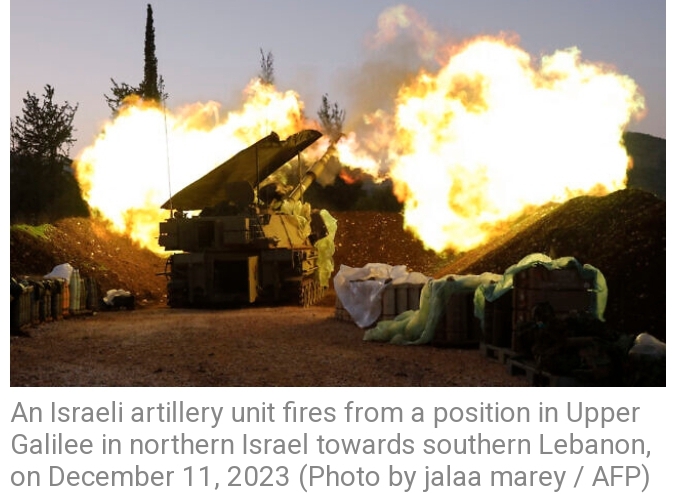Israel reportedly had warplanes in the air ready to carry out a major preemptive strike against Hezbollah in Lebanon four days after Hamas’s October 7 terror onslaught, but US President Joe Biden managed to convince Prime Minister Benjamin Netanyahu to stand down at the last minute.
The Wall Street Journal (WSJ) reported Saturday that Israeli officials urgently reached out to their American counterparts on October 11, relaying that they had compiled intelligence pointing to an imminent Hezbollah cross-border attack akin to the one carried out by Hamas in which some 1,200 people were massacred in Israel and roughly 240 were taken hostage.
Recognizing that the IDF could not pull off such a major strike against Hezbollah on its own, Israel was asking the US for assistance, the Journal said, citing unnamed officials familiar with the matter.
It was 6:30 a.m., and Biden’s top aides gathered for a meeting in which they went on to determine that US intelligence didn’t line up with what Israel was warning of, WSJ said.
Upon being briefed on what was unfolding, Biden phoned Netanyahu to relay Washington’s skepticism over the Israeli intelligence and urged the premier throughout the 45-minute call not to move forward with the strike, saying that a two-front war was still avoidable but an IDF attack of this sort would make it inevitable.
The US had been receiving messages from Iran through mediators saying that Tehran was not interested in further regional escalation, US officials have told The Times of Israel, and these messages ostensibly informed Washington’s response to the Israeli warning.
Netanyahu ended the call telling Biden that he would talk it over with his aides.
Meanwhile, the IDF ordered the tens of thousands of troops it had amassed on the northern border after the October 7 onslaught to prepare for a multi-pronged Hezbollah assault, with terrorists paragliding and driving through the northern border, WSJ said, adding that an alert was sent out to Israeli residents of the north ordering them to immediately enter bomb shelters.
Israeli and US officials told the Journal that those alerts ended up being false alarms, but Israeli and US officials proceeded to have six hours of back-and-forth phone calls on the matter.
Defense Minister Yoav Gallant was pushing hard for the preemptive strike and also had the backing of the IDF, according to the Walla news site.
Netanyahu opposed the idea but didn’t want to be a minority voice against a strike.
The prime minister managed to simultaneously ink an agreement with Benny Gantz for the latter’s National Unity party to enter the government.
Gantz and his National Unity colleague Gadi Eisenkot agreed with Netanyahu that a preemptive strike was a bad idea, Walla said.
With Gantz and Eisenkot — two former IDF chiefs of staff — in his camp and now part of the war cabinet, Netanyahu felt he was in a better position to stand up to Gallant.
The war cabinet decided later in the day to call off the attack.
The Prime Minister’s Office denied the WSJ report, asserting that Netanyahu decided after October 7 that Israel’s first priority would be to focus on the southern front and that this position was adopted by the war cabinet.
Previous reports also said it was Gallant and IDF officials who wanted to attack Hezbollah before tackling Hamas, based off the military doctrine that prioritizes dealing with the more formidable enemy first if fighting on two fronts. Those earlier reports said Netanyahu rejected the doctrine in this case.
The Defense Ministry, CIA, and US State Department declined to comment on the report.
Pentagon press secretary Patrick Ryder said Washington is worried over the clashes on the Lebanese border but declined to comment on the details of the report.
Meanwhile, an Israeli official told WSJ that a deal to force the terror group away from from the border is “doable” after two months of strikes that caused a major blow to Hezbollah.
The Biden administration has been focusing its efforts ever since on preventing an escalation that would require Washington’s military intervention. In the days after October 7, Washington sent two aircraft carriers and a nuclear submarine to the eastern Mediterranean to deter regional actors seeking to expand the ongoing Israel-Hamas war in Gaza.
The border between Lebanon and Israel has still seen escalating exchanges of fire, raising fears of a broader conflagration. Tens of thousands of Israelis have been evacuated from northern border towns, which have been repeatedly targeted by the Hezbollah.
Related posts
Categories
- Advertisements (1)
- Agriculture (45)
- Breaking News (26)
- Business (597)
- Crime (983)
- Education (318)
- Entertainment (128)
- Features (13)
- For The Records (43)
- Foreign News (1,184)
- Health (219)
- Home News (332)
- Interview (9)
- Judiciary (348)
- Lifestyle (140)
- Local News (111)
- National News (1,446)
- Opinion (26)
- Politics (1,001)
- Religion (156)
- Science and Technology (125)
- Security (676)
- Sports (877)
- States' News (812)
- Transportation (326)
- Uncategorized (10)

